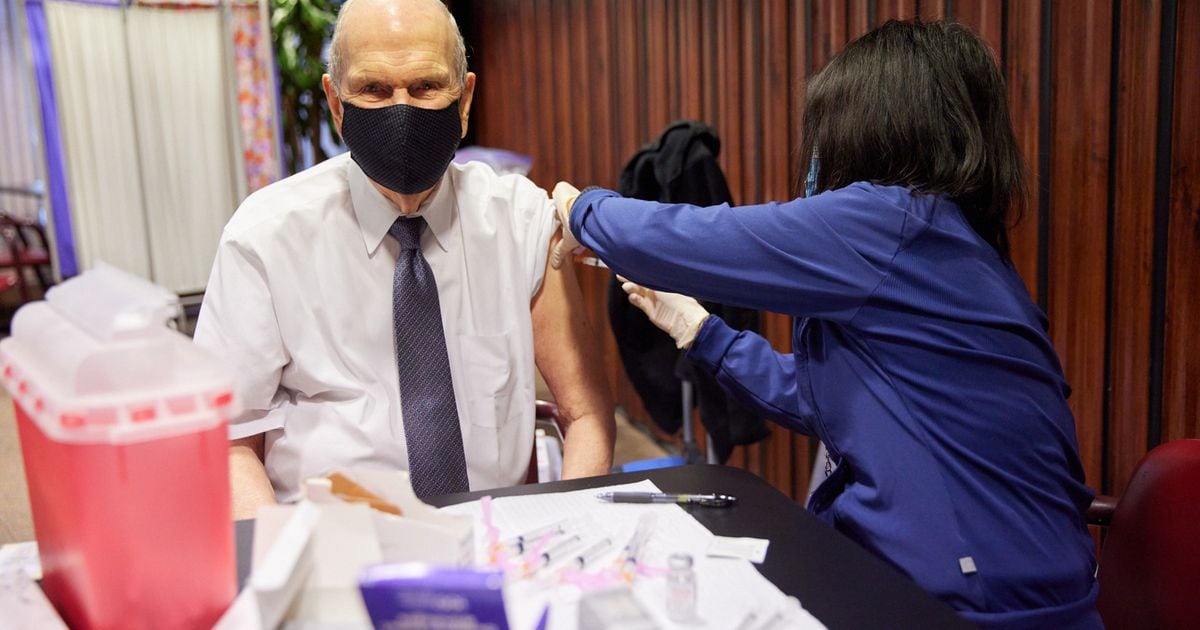Church leaders encourage their members to get vaccines as well.
(Photo courtesy of The Church of Jesus Christ of Latter-day Saints) Church President Russell M. Nelson receives the first dose of the COVID-19 vaccine on Tuesday, January 19, 2021, in Salt Lake City.
And they expect all other members of The Church of Jesus Christ of Latter-day Saints to follow their example.
The statement acknowledged that everyone will make their own decisions, but said that he expects individuals to “consult with a competent medical professional about their personal needs and circumstances”.
Nelson, Oaks and Eyring were immunized on Tuesday, as were apostles M. Russell Ballard, 92; Jeffrey R. Holland, 80; Dieter F. Uchtdorf, 80; Quentin L. Cook, 80; and D. Todd Christofferson, 75. Most of his wives were also vaccinated at the same time.
(Photo courtesy of The Church of Jesus Christ of Latter-day Saints) Dallin H. Oaks, first counselor in the church’s First Presidency, receives the first dose of the COVID-19 vaccine on Tuesday, January 19, 2021, in Salt Lake City.
“I am happy that it is our turn to get the vaccine,” Oaks said in the statement. “We are very hopeful that the general vaccination of the population will help us to overcome this terrible pandemic. It is hopeful, like the light at the end of the tunnel. There is relief and appreciation involved for those who invented the vaccine and for those who made it generally available on a sensible priority system. “
The church “has recognized the importance of vaccines and immunizations for decades,” according to the statement. As early as 1978, the denomination urged members to “protect their own children through immunization”.
Since 2002, the 16.5 million-member religion has also helped finance 168 projects in 46 countries, including many that provide immunizations. Latter-day Saint Charities, the church’s humanitarian arm, provided financial support to “prominent global immunization partners to obtain and deliver vaccines, monitor disease, respond to outbreaks, train health workers and develop programs for elimination and eradication.”
(Photo courtesy of UNICEF and The Church of Jesus Christ of Latter-day Saints) A healthcare professional vaccinates a baby while his mother holds him at the Sante le Rocher Maternity Center in Lubumbashi, Congo, November 2018.
A sizable minority, however, said they would not follow their example, arguing that vaccines are unproven or even dangerous and that immunization shows a lack of faith in the divine healing power.
Some have suggested that Nelson embraces vaccines because he is a former doctor, not a prophet, on this issue, and said that they would like the church to stay out of medical decisions.
A woman, who identified herself as K. Moore of West Jordan, said in a message that she will not receive the vaccine because her son “is injured by the vaccine”. She prefers the church to be “vaccine neutral”.
This is not the first time that Latter-day Saints have been divided over vaccines.
Antivaxxers of the past
After all, Bowman pointed out, it was only 10 years after the federal government excluded Mormons and demanded that the church give up polygamy.
“This is where an LDS lineage distinct from Western libertarianism developed,” said the historian. “Many suspicions of government mandates were a hangover from that time.”
Tuesday’s announcement about vaccinating leaders, Bowman predicted, is likely to change few thoughts among Latter-day Saints. Whoever is in favor of the vaccine will get it; those who oppose, no.
“Campgrounds in the middle are the only ones,” he said, “that could be influenced by LDS general authorities asking them to do so.”
(Photo courtesy of The Church of Jesus Christ of Latter-day Saints) Church apostle Jeffrey R. Holland receives the first dose of the COVID-19 vaccine on Tuesday, January 19, 2021, in Salt Lake City.
